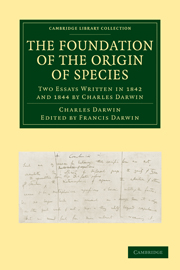PART I
Published online by Cambridge University Press: 07 September 2010
Summary
〈ON VARIATION UNDER DOMESTICATION, AND ON THE PRINCIPLES OF SELECTION.〉
An individual organism placed under new conditions [often] sometimes varies in a small degree and in very trifling respects such as stature, fatness, sometimes colour, health, habits in animals and probably disposition. Also habits of life develope certain parts. Disuse atrophies. [Most of these slight variations tend to become hereditary.]
When the individual is multiplied for long periods by buds the variation is yet small, though greater and occasionally a single bud or individual departs widely from its type (example) and continues steadily to propagate, by buds, such new kind.
When the organism is bred for several generations under new or varying conditions, the variation is greater in amount and endless in kind [especially holds good when individuals have long been exposed to new conditions]. The nature of the external conditions tends to effect some definite change in all or greater part of offspring,—little food, small size— certain foods harmless &c. &c organs affected and diseases—extent unknown. A certain degree of variation (Müller's twins) seems inevitable effect of process of reproduction. But more important is that simple (?) generation, especially under new conditions [when no crossing] 〈causes〉 infinite variation and not direct effect of external conditions, but only in as much as it affects the reproductive functions.
- Type
- Chapter
- Information
- The Foundation of the Origin of SpeciesTwo Essays Written in 1842 and 1844 by Charles Darwin, pp. 1 - 21Publisher: Cambridge University PressPrint publication year: 2009First published in: 1909

